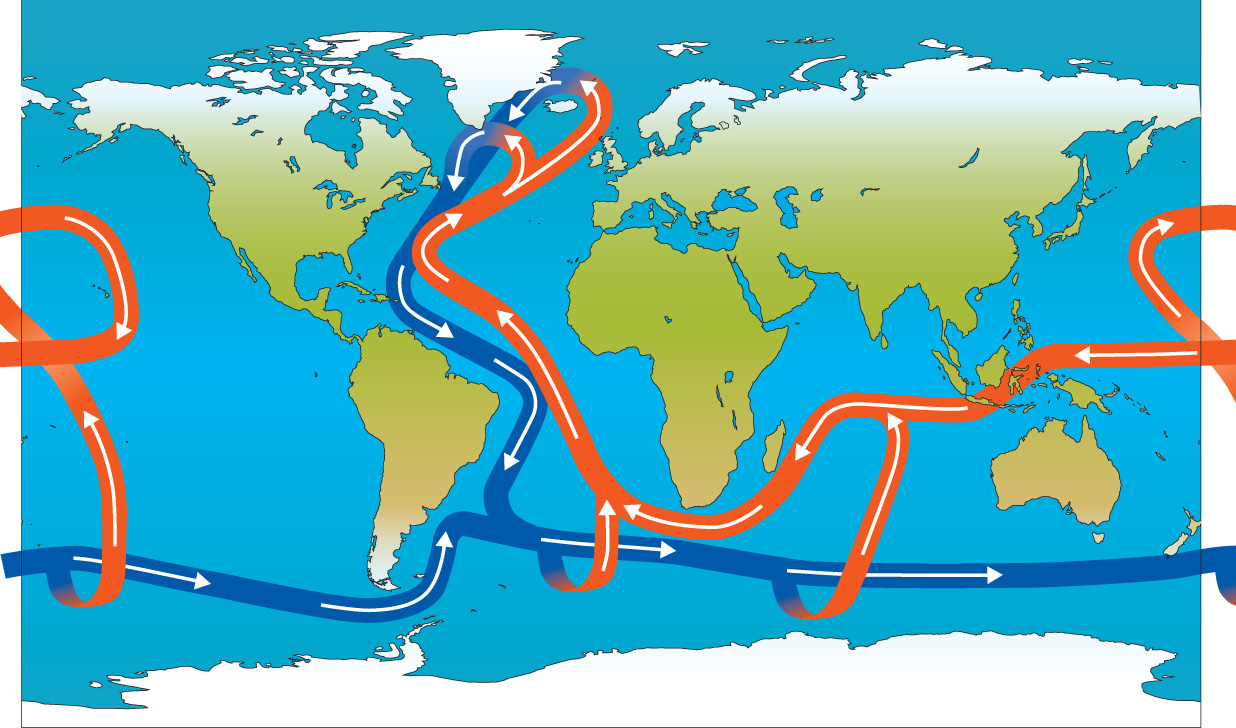For 20 years, an array of instruments strung across the North Atlantic has been monitoring the strength of one of the largest and most important systems of ocean currents in the world.
The Atlantic Meridional Overturning Circulation (AMOC), which includes the Gulf Stream, moves heat northwards in the Atlantic and means that Europe is milder than it would otherwise be. Potential climate change-induced collapse of the system has been suggested, but what have scientists discovered with two decades of monitoring?
The ocean plays a key role in our climate system by taking up heat from the atmosphere and moving it around the globe. The AMOC system of currents moves water northwards in the upper ocean from the tropics towards the northern North Atlantic, where the water loses its heat to the atmosphere and becomes colder and sinks. Deep waters return southwards and travel around the globe, returning to the surface through winds in the Southern Ocean and through mixing.

Ocean circulations with blue arrows indicating cold deep water and red arrows indicating warm surface water.
Weakening of the AMOC
Laura Jackson is a Met Office scientist who has studied North Atlantic ocean currents for many years. She said: “The AMOC strength can vary from one decade to the next, which affects weather patterns in the UK and Europe. A warming climate makes it harder for the northern waters to cool and sink, and so it is considered very likely that the AMOC will weaken with human-induced climate change. This weakening would reduce the heat moved northwards, so Europe would experience less warming than if the AMOC didn’t weaken. This could reduce the impact of global warming in this region but may also cause other changes in our weather patterns such as more winter storms.”
AMOC collapse
She continued: “One unlikely possibility is that the AMOC might reach a ‘tipping point’ causing it to rapidly weaken. In that case the cooling from AMOC weakening would be stronger than the background warming, and we would experience colder temperatures. Although this is unlikely to happen, it could have devastating impacts, causing cooling in the North Atlantic, large changes in precipitation, shifts in regional weather patterns and large impacts on ecosystems and human activities. UK and European impacts are explored in the latest Marine Climate Change Impacts Partnership Ocean Circulation report. Changes in temperature, wind and rainfall patterns as well as increases in storm surges would have wide implications for the UK such as impacts on agriculture, marine industries and renewable energy production.
The Intergovernmental Panel on Climate Change (IPCC) AR6 (sixth assessment) report judged that, although a weakening of the AMOC by 2100 is very likely, there is medium confidence that a collapse will not occur. However, given the potential impacts, this it is still an important area of research.
Observations
She added: “The international community has been observing the AMOC at 26oN for the last 20 years at the RAPID array. These observations have been very useful for testing how well our climate models are representing the AMOC and for understanding how the AMOC affects the climate. We have also seen how the AMOC varies on many different timescales – in particular it weakened over the first decade and then stabilised, or possibly strengthened. Changes from one decade to another are expected from natural climate variability, so it is hard to detect a long-term weakening from climate change. Hence, we need longer a time series. Other ways of monitoring the AMOC (such as recent observations further north at the OSNAP array) are also useful additions.”
Ongoing research
Laura concluded: “There is ongoing research in the Met Office to improve our understanding of how the AMOC might change in the future and what impacts that would have on our weather and society.” Scientists are also investigating AMOC tipping points through the EU project ClimTip.


